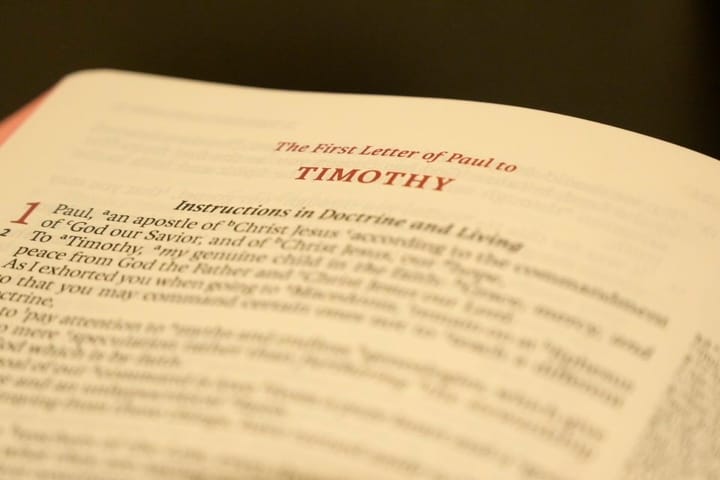Ten Marks of Christian Friendship — 1 Samuel 18:1–5
Jonathan's friendship with David illustrate ten attributes found in Christian friendship which are more perfectly exemplified in Christ Jesus.

| Listen on Apple Podcasts | Listen on Spotify |
|---|
Introduction
The last two weeks, we examined David and Goliath, one of the most beloved stories in the Old Testament. Today, we will look at perhaps the most beloved friendship that is recorded in the Old Testament, the friendship between Jonathan and David.
You would think that as Christians, friendships will always be plentiful.
- We have so much in common.
- We are united in Christ, with one faith, one hope, and one God.
Sadly, friendships today are rare.
- Perhaps you have attended church for some time, but you have yet to find a good Christian friend.
So this morning, I want us to look at the first five verses of 1 Samuel 18 and identify ten marks of Christian friendship.
- What are the characteristics of a true friend?
- What are the attributes of Christian friendship?
- The goal is not just to find a good friend but to be a good friend.
1. Christian Friendships Are Unplanned. (v.1a)
"Now it happened when he had finished speaking to Saul." (v.1a)
Unexpected Timing
- "As soon as he had finished speaking to Saul" (ESV)
- During this recent military encounter with the Philistines, finding a new friend was not forefront in Jonathan’s mind.
- This friendship developed unexpectedly.
- It appeared without warning.
- The friendship was not premeditated, not planned.
Unexpected Pairing
- David was a commoner, a shepherd. Jonathan was the crowned prince.
- David was a young teenager. Jonathan was well over twenty years old and had years of military experience.
- David is from the tribe of Judah. Jonathan is from the tribe of Benjamin.
- There is no commonality in tribe, age, or socio-economic status.
Unexpected Speed
- Jonathan and David had little time together and no prior meaningful interaction.
- After David's victory over Goliath, Jonathan's friendship with David developed almost instantly.
Application:
- Be ready and be prepared to become a good friend.
- Like a foster parent receiving a phone call and in short notice receive a estranged child, we need to be ready to receive a new friend.
2. Christian Friendship Involves the Soul. (v.1b)
"The soul of Jonathan was knit to the soul of David" (v.1b)
- "Jonathan was bound to David in close friendship." (CSB)
- "Jonathan became one in spirit with David" (NIV)
- ESV and NAS preserve the expression, "the soul of Jonathan was knit to the soul of David,"
- This expression is used in Genesis 44:30.
When Judah gave his emotional speech unknowingly to his brother Joseph, offering to be surety for his youngest brother Benjamin, Judah said,
When I come to your servant my father [Jacob], and the boy [Benjamin] is not with us — and his life is bound up in the boy's life. It will be that when he sees that the boy is not with us, he will die. (Gen 44:30–31)
- Judah tells Joseph that if something happens to Benjamin, his father Jacob will die.
- “His life is bound up in the boy's life” is the same Hebrew expression as “Jonathan’s soul was knitted to the soul of David.”
- Jonathan's life "is bound up in David's life."
Many friendships today are merely transactional.
- Friendships are formed purely as an alliance for mutual benefit.
- You're interested in what someone posts on social media, so you send a "friends request."
- You carpool with someone, and we call that friendship.
- Any symbiotic human relationship, we call it friendship.
But Christian friendship involves the inner self, the heart, and the soul.
Application:
- So be prepared that a new friendship can develop unexpectedly.
- And cultivate an expectation that a new friendship will involve your soul and your entire inner self.
3. Christian Friendship Requires Love. (v.1c)
"Jonathan loved [David]" (v.1c)
- The Hebrew word (אַהֲבָה, ahavah) translated "love" here in verse one is translated agapáō in the Greek translation.
- This love presupposes a concrete inner disposition which is based on experiences and events, and it includes a conscious act in behalf of the person who is loved. [TDOT V1, p.105]
Inner disposition based on experiences and events.
- Jonathan had no meaningful interaction with David.
- Jonathan heard David's words when David volunteered to fight Goliath. He witnessed David’s courage and passion to seek God’s honor.
- Jonathan saw how the Israelite army were inspired and how they pursued the Philistines back to Gath and Ekron. David was a capable leader.
- Jonathan sees David's humility after his victory. David acknowledged his dependency on God.
- And these events and experiences persuade Jonathan to make a conscious decision.
Deliberate act of the will.
- This love is an intentional act of the will, not compelled by unbridled feelings and emotions.
- God’s love works the same way.
- "In this is love, not that we have loved God, but that He loved us and sent His Son to be the propitiation for our sins. Beloved, if God so loved us, we also ought to love one another." (1 John 4:10–11)
- God chose to love us.
- And because He loved us, we ought to love one another.
- If there is no love, there is no friendship.
As Christians, we are called by God to love one another, to love our neighbor.
- But not every person in this world is our friend. Christian friendship is selective.
4. Christian Friendship Is Selective. (v.1c)
"Jonathan loved [David]" (v.1c)
- A man after God's own heart is rare today, and he was equally scarce during the time of Jonathan.
- Jonathan was surrounded by many who would love to have been the prince's friend.
- Everyone wanted to be his friend. He was rich and powerful, and he was also a godly man.
The text does not say Jonathan befriended everyone. It says that Jonathan loved David. We are not to be exclusive, but our friendships need to be purposeful.
- "A man of too many friends comes to ruin, but there is a friend who sticks closer than a brother." (Prov 18:24)
- Shallow, superficial friends generally cause trouble.
- But a genuine friend can be more loyal than one's own brother.
- "Do not befriend a man of anger; and do not come along with a man of great wrath, lest you learn his ways and take on a snare against your soul." (Prov 22:24–25)
- God warns us not to befriend people of poor character and be dragged down by their bad influence.
- "Iron sharpens iron, so one man sharpens another." (Prov 27:17)
- There is a positive effect when you surround and interact with people of worthy character.
As Christians, we love all our neighbors, but be selective who you call, "Friend."
- Jonathan probably waited his entire life to find someone of such kindred spirit, someone who loved the LORD and was willing risk everything for God's honor.
- So when he recognized David's character, he sought out David's friendship.
But notice Jonathan did not initiate this friendship for Jonathan’s benefit only. Instead, we see the fifth mark of Christian friendship. "Christian friendship seeks other's good."
5. Christian Friendship Seeks Other's Good. (v.1d)
"Jonathan loved him as his own soul." (v.1d)
- If you want a biblical definition of friendship, this is it.
- A friend loves the other person as his own soul.
- Deuteronomy 13:6 says, "If your brother, your mother's son, or your son or daughter, or the wife you cherish, or your friend who is as your own soul..."
- During Jonathan and David, family was preeminent.
- Deut 13:6 justaposes first degree relatives (brother, son and daughter, and spouse) with a friend.
- And the full description of this friend is "your friend who is as your own soul."
- The Hebrew word (אהב, 'hb) translated as love, when directed to another person, is commonly used to describe love for a first-degree relative. [HALOT]
- "Take now your son, your only one, whom you love" (Gen 22:2 - Abraham to Isaac)
- "Isaac loved Esau..., but Rebekah loved Jacob" (Gen 25:28)
- "Your daughter-in-law, who loves you and is better than seven sons" (Ruth 4:15 – Ruth to Naomi)
- Jonathan receives David like a brother, which leads to the sixth mark.
6. Christian Friendship Shuns Envy. (v.2)
"And Saul took him that day" (v.2a)
- Several Bible translations say "Saul kept David," and that is true given what is stated in the latter part of verse two.
- But The Hebrew verb (לקח, lqh) means "to take, grasp, and seize" [HALOT]
- It should remind us of 1 Samuel 8:11, "[The king] will take your sons and appoint them for himself in his chariots..."
"Saul did not let him return to his father's house." (v.2b)
- Remember back in 1 Samuel 17:15, before David had gone to the battlefield, it says that "David went back and forth from Saul [in Gibeah] to shepherd his father's flock at Bethlehem."
- David was commissioned as Saul's musician and armor bearer.
- But now, David is taken by Saul as a permanent resident of his household.
- David was not allowed to return to his father's house because he was now a member of Saul's household.
** David had become a permanent member of Saul's family.**[1]
- He was not just a permanent member of the court, for court members were allowed to return to their homes.
- David's "house" was no longer Jesse's.
- A transfer of family allegiance had occurred.
- Saul, in another sense, had adopted David as a son.
Jonathan accepts David into the household with no hint of jealousy, no trace of envy.
- Jonathan had every reason to be envious.
- His father almost killed Jonathan after he led Israel to victory in chapter 14
- But here in chapter 18, Saul will shower David with blessing and privilege.
- David will be Israel's future king, not Jonathan.
- David will be popular and adored by God's people, more so than Jonathan.
Application:
- Envy will destroy friendship.
- Friendship cannot coexist with envy.
7. Christian Friendship Involves Commitment. (v.3)
"Then Jonathan cut a covenant with David." (v.3a)
- A covenant is an agreement that two people make, in which both promise either to do or not to do certain things.
- This covenant was initiated by Jonathan because Jonathan was superior in status to David.
"David is clearly Jonathan's subordinate. Jonathan is the king's son...[Jonathan] is in a position to give [David] leave of absence (1 Sam 20:5) and to be held responsible for that absence (1 Sam 20:27). David's subordinate position is also shown by the fact that he uses deferential language to Jonathan (1 Sam 20:7–8). The fact that David's name follows Jonathan's when the two form a compound also suggests his subordinate status."[2]
Application:
- Friendship is a commitment, and many of us today are either afraid of commitment or too lazy or indifferent to commit ourselves to others.
- When we make a commitment, there is inherent risk.
- We risk getting disappointed. We risk getting hurt.
- Before the foundation of the world, Jesus made a voluntary commitment to die on the cross. That was Plan A. It was not Plan B conceived after man's fall.
- The Son of God pledged to become a man and suffer on the cross for man's sin.
- Christian friendship makes commitments.
8. Christian Friendship Shows Humility. (v.4a)
"And Jonathan stripped himself of the robe that was on him." (v.4a)
- By taking off his royal robe, Jonathan recognized David as God's choice for the next king. [RSB]
- Later, Jonathan tells David, "Do not be afraid, because the hand of Saul my father will not find you, and you will be king over Israel, and I will be second to you." (1 Sam 23:17a)
Example of Christ
- Christ Jesus, the second person of the Trinity, is co-equal with God the Father.
- And yet, God the Son humbled Himself to come down from heaven, and He willingly stripped his robe to serve.
Read John 13:1–5
- Jesus was the guest of honor. He sat at the head of the table.
- He got up and laid aside His outer garments to wash the disciple's feet, a task generally assigned to the lowliest member of the household, a slave or servant if the family could afford one. [RSB]
[Jesus], although existing in the form of God, did not regard equality with God a thing to be grasped, but emptied Himself, by taking the form of a slave, by being made in the likeness of men. Being found in appearance as a man, He humbled Himself by becoming obedient to the point of death, even death on a cross. (Phil 2:6–8)
- "Greater love has no one than this, that one lay down his life for his friends." (John 15:13)
Application:
- A true Christian friend is content and happy to be number two.
- Not only is he willing to lay aside his position of superiority, but he is also willing to be his friend's servant.
9. Christian Friendship Is Generous. (v.4b)
"[Jonathan] gave [the robe] to David, with his armor, even his sword and his bow and his belt." (v.4b)
- When a man proposes to a woman today, he would often place an engagement ring with a precious stone to signify his sincerity and commitment.
- During this time, when a person made a covenant, he might give special gifts.
- When Jonathan stripped himself of his royal robe and gave it to David, he surrendered the royal throne to David.
- It is noteworthy that Jonathan also gives David his armor and weapons.
- These gifts demonstrated Jonathan's generosity.
- The best military weapons were not easily accessible.
"So it happened on the day of battle that neither sword nor spear was found in the hands of any of the people who were with Saul and Jonathan, but they were found with Saul and his son Jonathan." (1 Sam 13:22)
- The Israelites did not have weapons for their armies during this time.
- Because of this, after Israel's victory over Goliath and the Philistines, Israel likely plundered many of the Philistine's weapons.
- "And David took the Philistine's head and brought it to Jerusalem, but he put [Goliath's] weapons in his tent." (1 Sam 17:54)
- David, later in 1 Samuel 21:9, without any weapon in hand, asked for Goliath's sword and said, "There is none like it; give it to me."
Jonathan spared no expense in his generosity. He gave David his royal robe, and he divested his best weapons that could not be easily replaced and would leave Jonathan in his future military battles more vulnerable.
Which naturally leads to a tenth mark of Christian friendship.
10. Christian Friendship Promotes Success. (v.5)
"So David went out wherever Saul sent him and prospered." (v.5a)
- Wherever Saul had sent David with the army, David enjoyed success.
- God had given David victory over Goliath without any military armor or weapons.
- But I'm sure Jonathan's gifts also promoted David's military success.
- David was so successful that he was quickly promoted.
So "Saul set [David over the men of war]" and made David head of the army.
- Back in 1 Samuel 17:55, Abner was the commander of Saul's army.
- So David has supplanted Abner in this role as Saul's top military commander.
Jonathan wanted nothing more than to see David succeed.
- Jonathan gave David everything: his robe, his weapons, and his unwavering support.
- Jonathan promoted David's reputation, and "it was pleasing in the eyes of all the people and also in the eyes of Saul's servants." (v.5c)
Conclusion:
Christian Friendship is a precious gift from God. And because it is an important part of our Christian life, I want to leave you with two words of encouragement.
I. Be a good friend.
-
As we had previously noted, it's important to be selective.
- "Bad company corrupts good morals."
-
But don't worry or get discouraged about how your friends treat you. Focus on how you can grow in being a friend.
- Friendships are unplanned. They involve our inner soul.
- Friendships require love and seeking other's good.
- Friendships shun envy.
- They require commitment and humility.
- Friendship is generous, and it promotes other's success.
-
At the garden of Gethsemane, "Judas went to Jesus and said, 'Greetings, Rabbi!' and kissed Him. And Jesus said to him, 'Friend, do what you have come for.'" (Matt 26:49–50)
-
Seconds before His betrayal, Jesus still called Judas his friend.
-
Strive to be a good friend.
II. Know your best friend.
- Your best friend, if you are a follower of Christ, is Jesus.
- If you do not know Jesus as your personal Lord and Savior, repent and call out to Him today. Ask him to absolve you of your sins, and to call you not a sinner but a friend.
- Jesus said, "You are My friends if you do what I command you. No longer do I call you slaves, for the slave does not know what his master is doing; but I have called you friends." (Jn 15:14–15a)
What a friend we have in Jesus
All our sins and griefs to bear!
What a privilege to carry
Everything to God in prayer!
Oh, what peace we often forfeit,
Oh, what needless pain we bear,
All because we do not carry
Everything to God in prayer!




Comments ()